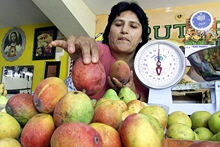
Typical street scene in Santa Ana, El Salvador. (Photo: iStock)
IMF Survey: Need to Invest More in the Food Supply Chain
May 14, 2008

"You cannot expect to feed over three billion city dwellers with locally grown produce." (photo: Pilar Olivares/Reuters).
High Commodity Prices
Dear IMF Survey:
I read with interest the article published in the April 28 IMF Survey on rising commodity prices. The causes of the upsurge in agricultural commodity prices over much of the past year have been thoroughly analyzed—as one might expect—and the urgent need for policies to prevent humanitarian crises in Africa has been convincingly demonstrated.
The IMF's coordinating role, and the liquidity facilities which it provides, will help the poorest countries to overcome the present crisis. Yet many challenges remain.
By definition, a crisis is short-term in nature and, like an earthquake, reflects the tensions involved in any shift to a new state of equilibrium. In such cases, the first priority is of course to aid the victims. And yet it is also essential to build a new and sustainable economic equilibrium.
Flight to urban areas
Over the decades, thanks to rising agricultural productivity around the world, the relative prices of agricultural commodities have steadily declined, and consumers have benefited. This has gradually weakened the economic arguments in favor of investment in the agri-food sectors, while the gap between farmers' incomes and incomes of wage and salary earners in urban areas has inexorably increased, resulting in further flight from rural areas into the cities.
Since 2007, a majority of the world's population has been living in urban areas. Furthermore, even if global trade is only the tip of the iceberg (such trade affects less than 10 percent of world production and consumption) the technological revolution in logistics (lot containerization and real-time space management) has revolutionized trade management. Our new economic framework must take account of these changing conditions.
Experience shows the decisive role which upstream operators in the food chain play in the development of agricultural production. You cannot expect to feed over three billion city dwellers with locally grown produce. Advocacy of small-scale farming, instead of production-focused agriculture, is a wealthy person's pastime which fails to take these facts into account. How can we hope to provide a decent food supply for the inhabitants of Lagos, Cairo, Kinshasa, Algiers, or Mexico City purely through the output of nearby smallholders and family farms?
The proximity of nearby urban areas undoubtedly creates a firsthand marketing opportunity for tens of thousands of producers. And yet, most goods must still be collected, warehoused, shipped, processed to preserve their quality, transported, and distributed by intermediaries to reach urban consumers.
Sustainable development of food supply chain
Sustainable development of such a food supply chain requires developing complex and complementary forms of expertise. It has been demonstrated—by U.S. academics in particular—that training and research yield the best returns on investment. Thus the IMF should commit to supporting the investment efforts programmed by the government authorities working in partnership with economic transactors.
For some fifteen years, the International Commission for Food Industries has been arranging ongoing training sessions for agri-food sector personnel. There are plans to organize such sessions on a distance training basis in partnership with the Commission's associate members. Collaborative efforts with the IMF in this area would undoubtedly enhance the effectiveness of such exercises.
Very truly yours,
Michel Foucault
Secretary General, CIIA
International Commission for Food Industries
Paris, France







